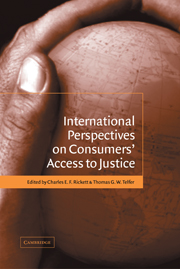Book contents
- Frontmatter
- Contents
- List of contributors
- Preface
- Table of cases
- Table of statutes
- 1 Consumers' access to justice: an introduction
- Part I Perspectives on consumers' access to justice
- Part II Issues in contract and tort
- Part III Services and the consumer
- Part IV Consumer bankruptcy law
- Part V Procedure and process issues
- Part VI Conflict of laws issues
- 14 Adapting international private law rules for electronic consumer contracts
- 15 Waving goodbye to conflict of laws? Recent developments in European Union consumer law
- Index
15 - Waving goodbye to conflict of laws? Recent developments in European Union consumer law
from Part VI - Conflict of laws issues
Published online by Cambridge University Press: 11 July 2009
- Frontmatter
- Contents
- List of contributors
- Preface
- Table of cases
- Table of statutes
- 1 Consumers' access to justice: an introduction
- Part I Perspectives on consumers' access to justice
- Part II Issues in contract and tort
- Part III Services and the consumer
- Part IV Consumer bankruptcy law
- Part V Procedure and process issues
- Part VI Conflict of laws issues
- 14 Adapting international private law rules for electronic consumer contracts
- 15 Waving goodbye to conflict of laws? Recent developments in European Union consumer law
- Index
Summary
Introduction
It is a widely held view that the law with respect to electronic commerce and consumer protection across national borders is in a state of chaos. It is whispered in the hallways of law schools that the Internet has brought about a new world which is expanding rapidly and forcing a myriad of jurisdictional and conflict of laws problems on us. Law students ask their teachers why they do not teach them ‘Internet law’. Governmental bureaucracies claim that there is great legal uncertainty, which hinders the growth of electronic commerce. A typical example of this position is the argument of the European Commission as to why it felt that a Directive on electronic commerce was necessary:
The development of information society services within the Community is hampered by a number of legal obstacles to the proper functioning of the internal market which make less attractive the exercise of the freedom of establishment and the freedom to provide services; these obstacles arise from divergences in legislation and from the legal uncertainty as to which national rules apply to such services; in the absence of coordination and adjustment of legislation in the relevant areas, obstacles might be justified in the light of the case-law of the Court of Justice of the European Communities; legal uncertainty exists with regard to the extent to which Member States may control services originating from another Member State.
These assumptions rest on weak foundations. Consumer transactions through the Internet are still not very common, at least not in the European Union.
- Type
- Chapter
- Information
- International Perspectives on Consumers' Access to Justice , pp. 384 - 406Publisher: Cambridge University PressPrint publication year: 2003



